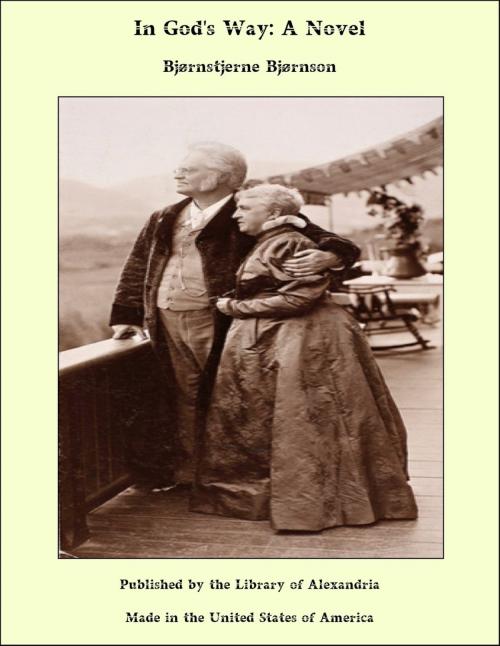| Author: | Bjørnstjerne Bjørnson | ISBN: | 9781465607102 |
| Publisher: | Library of Alexandria | Publication: | March 8, 2015 |
| Imprint: | Language: | English |
| Author: | Bjørnstjerne Bjørnson |
| ISBN: | 9781465607102 |
| Publisher: | Library of Alexandria |
| Publication: | March 8, 2015 |
| Imprint: | |
| Language: | English |
Among many Scandinavian candidates for fame in the province of fiction, by far the most distinguished in our own day is the Norwegian, Björnstjerne Björnson. He is a child of the mountains; it was in the remote and romantic parish of Kvike, of which his father was priest, that he was born on the 8th of December, 1832. In the bleak parsonage high up in a ravine of the hills, the child led the solitary life which he has described in the little story called Blakken. When he was six years old, his father was transferred to Næsset, in the Romsdal, one of the loveliest parishes in Norway, where the influences of natural beauty and a full peasant society instantly began to mould the child's poetic sensations. At the grammar school of Molde, Björnson was an active, tiresome, and industrious boy; in whom, at about the age of fifteen, a feeling for literature was suddenly awakened, by the reading of Wergeland's poem, The English Pilot. At seventeen, he was sent to a high school at Christiania, and in 1852 he entered the university. At the age of twenty he began to write dramas in verse, none of which have seen the light, and a little later he began to live by journalism in the capital. His early career was one of struggle against privation and disappointment. It was not until 1857 that Björnson made his literary debut, with a little historic drama, called Between the Battles, and with a novel, Synnöve Solbakken, of unprecedented charm and freshness, an exceedingly naïve study of peasant life in Norway; of this four or five separate translations exist in the English language. He was now suddenly famous, and the great success of this book led the author to write a similar, but perhaps a stronger novel, Arne, in 1858. Of this also many versions have been made. In 1860 followed Short Stories, a volume including six tales, one of which, "A Happy Boy," has been regarded as Björnson's most successful effort in this line of peasant-romance. He proceeded to concentrate his attention on a revival of the poetical drama, and wrote a succession of masterly tragedies and a good comedy. His next novel, The Fisher Maiden, did not appear until 1868. Absorbed in dramatic work of various kinds, a short story called The Bridal March, 1873, was Bjornson's only contribution to fiction for several years. When he reappeared as a novelist, a great change in his manner was discernible. In Magnhild, published in 1877, his exquisite purity and simplicity of style had disappeared; this book was more real, perhaps, but it was much more turbid and more speculative than his early mountain romances. Björnson had been touched by the "novel of experience," and had been troubled by it. Captain Mansana, a story of the Italian war, was slight in character. Everything seemed to point to the abandonment of prose fiction by Björnson, in favour of the drama, in which he had made and was still making a series of paradoxical successes. Quite in recent years, however, Björnson has returned to the novel, and has produced several works of extraordinary merit. Among these, the latest, In God's Way, which was originally published in 1889, has been universally received as the most remarkable. It is a book which combines the romantic colour and ideal glow of the author's early pastoral stories, with a deeper insight into life and a graver examination of the relations of impulse to duty.
Among many Scandinavian candidates for fame in the province of fiction, by far the most distinguished in our own day is the Norwegian, Björnstjerne Björnson. He is a child of the mountains; it was in the remote and romantic parish of Kvike, of which his father was priest, that he was born on the 8th of December, 1832. In the bleak parsonage high up in a ravine of the hills, the child led the solitary life which he has described in the little story called Blakken. When he was six years old, his father was transferred to Næsset, in the Romsdal, one of the loveliest parishes in Norway, where the influences of natural beauty and a full peasant society instantly began to mould the child's poetic sensations. At the grammar school of Molde, Björnson was an active, tiresome, and industrious boy; in whom, at about the age of fifteen, a feeling for literature was suddenly awakened, by the reading of Wergeland's poem, The English Pilot. At seventeen, he was sent to a high school at Christiania, and in 1852 he entered the university. At the age of twenty he began to write dramas in verse, none of which have seen the light, and a little later he began to live by journalism in the capital. His early career was one of struggle against privation and disappointment. It was not until 1857 that Björnson made his literary debut, with a little historic drama, called Between the Battles, and with a novel, Synnöve Solbakken, of unprecedented charm and freshness, an exceedingly naïve study of peasant life in Norway; of this four or five separate translations exist in the English language. He was now suddenly famous, and the great success of this book led the author to write a similar, but perhaps a stronger novel, Arne, in 1858. Of this also many versions have been made. In 1860 followed Short Stories, a volume including six tales, one of which, "A Happy Boy," has been regarded as Björnson's most successful effort in this line of peasant-romance. He proceeded to concentrate his attention on a revival of the poetical drama, and wrote a succession of masterly tragedies and a good comedy. His next novel, The Fisher Maiden, did not appear until 1868. Absorbed in dramatic work of various kinds, a short story called The Bridal March, 1873, was Bjornson's only contribution to fiction for several years. When he reappeared as a novelist, a great change in his manner was discernible. In Magnhild, published in 1877, his exquisite purity and simplicity of style had disappeared; this book was more real, perhaps, but it was much more turbid and more speculative than his early mountain romances. Björnson had been touched by the "novel of experience," and had been troubled by it. Captain Mansana, a story of the Italian war, was slight in character. Everything seemed to point to the abandonment of prose fiction by Björnson, in favour of the drama, in which he had made and was still making a series of paradoxical successes. Quite in recent years, however, Björnson has returned to the novel, and has produced several works of extraordinary merit. Among these, the latest, In God's Way, which was originally published in 1889, has been universally received as the most remarkable. It is a book which combines the romantic colour and ideal glow of the author's early pastoral stories, with a deeper insight into life and a graver examination of the relations of impulse to duty.















